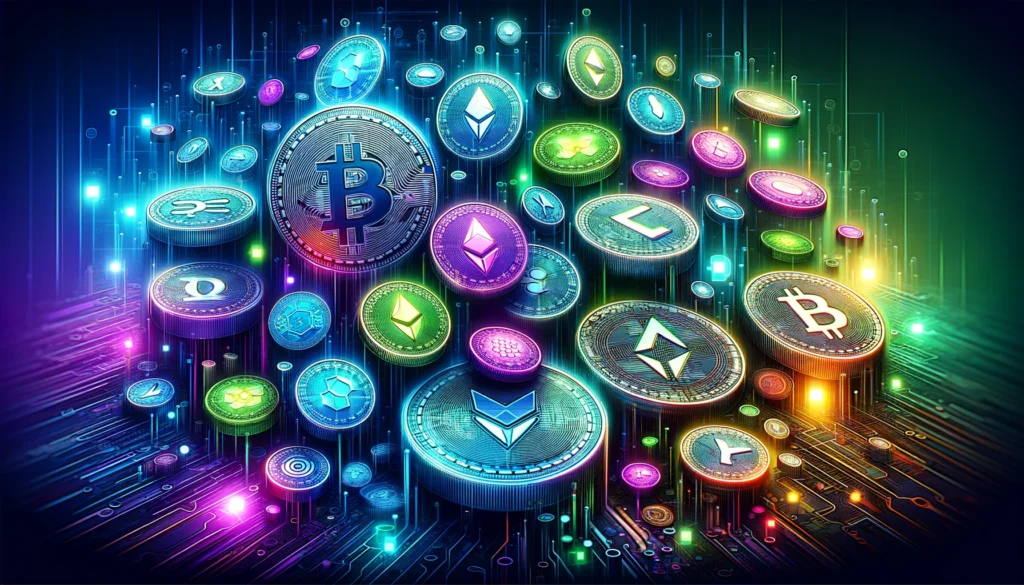Altcoins stand as pivotal players alongside Bitcoin. These coins, making up nearly 60% of the entire cryptocurrency market, offer diverse functionalities and possibilities. This article delves into the various categories of Altcoins, providing a comprehensive understanding for beginners and seasoned investors alike.
Stablecoins
Stablecoins bring stability to the typically volatile cryptocurrency market by pegging their value to more stable assets. They are ideal for users seeking minimal price fluctuations in their digital currency investments. Examples include Tether (USDT), USD Coin, and MakerDAO’s DAI.
Utility Tokens
Utility Tokens, like Ethereum’s Ether (ETH), offer access to specific functions on their respective blockchain networks. These tokens are not just digital currencies but serve as keys to a range of blockchain-based services and applications.
Security Tokens
Representing real-world assets like stocks, Security Tokens bridge traditional finance and the blockchain world. They offer a digital form of equity and are often subject to regulatory oversight, exemplified by tokens like Polymath (POLY) and tZero (t0).
Privacy Coins
For those prioritizing transactional anonymity, Privacy Coins like Monero (XMR) offer a solution. These coins are designed to obscure transaction details, providing a higher level of privacy and security.
Meme Coins
Reflecting the playful side of the internet, Meme Coins like Dogecoin (DOGE) have gained popularity for their cultural appeal and community-driven value.
Governance Tokens
Governance Tokens empower users with decision-making capabilities in their respective networks. Holders can vote on significant changes, maintaining the decentralized ethos of the platforms. MakerDAO’s MKR token is a prime example.
Financial Tokens
Used within cryptocurrency exchanges, Financial Tokens like Binance’s BNB Coin offer benefits like reduced transaction fees or access to exclusive services.
Infrastructure Tokens
These tokens, including Ether (ETH), Cardano (ADA), and Solana (SOL), are fundamental to the functioning and development of their respective blockchain infrastructures.
Service Tokens
Service Tokens, like Storj, enable access to specific network services, often acting as a medium of exchange within their ecosystems.
Media and Entertainment Tokens
Tokens like Basic Attention Token (BAT) are revolutionizing the media and entertainment industries by offering innovative monetization methods and incentives for user engagement.
Play-To-Earn Tokens
In the blockchain gaming world, Play-To-Earn Tokens like Axie Infinity’s AXS allow players to earn rewards through gameplay, integrating entertainment and income generation.
Environmental and Social Governance Tokens (ESG Tokens)
ESG Tokens cater to the growing demand for socially responsible and sustainable investing in the crypto space.
Real Estate and Asset-Backed Tokens
These tokens represent a digital stake in real-world assets, making investment opportunities like real estate more accessible.
NFT Tokens (Non-Fungible Tokens)
A rapidly growing category in the altcoin space is Non-Fungible Tokens (NFTs). Unlike other cryptocurrencies, NFTs represent unique assets, making them non-interchangeable. They have gained immense popularity in digital art, collectibles, and online gaming, providing a new way to authenticate and transfer ownership of unique digital items.
DeFi Tokens (Decentralized Finance Tokens)
DeFi Tokens are at the heart of the decentralized finance movement. They facilitate a range of financial services, including lending, borrowing, and earning interest, in a decentralized setting. These tokens operate on protocols that aim to recreate and improve upon traditional financial systems without the need for intermediaries.
Exchange-Specific Tokens
Many cryptocurrency exchanges issue their own tokens, which can be used within the exchange for various purposes, such as trading fee discounts, participation in token sales, or reward programs. Binance’s BNB and Huobi Token (HT) are notable examples.
Layer 2 Scaling Solution Tokens
Layer 2 scaling solutions like Polygon (MATIC) have their own tokens, which play a crucial role in enhancing transaction speeds and reducing costs on their respective blockchain networks. These tokens are vital for users seeking efficiency and scalability in their blockchain interactions.
Commodity-Backed Tokens
These altcoins are backed by physical commodities like gold, silver, or oil, providing a tangible asset base. They offer a bridge between the traditional commodity market and the digital currency space, attracting investors seeking assets with intrinsic value.
Artificial Intelligence (AI) and Machine Learning (ML) Tokens
AI and ML tokens are emerging as integral parts of projects that integrate blockchain technology with artificial intelligence and machine learning. These tokens are used to incentivize and facilitate the development of AI and ML solutions on blockchain platforms, representing the intersection of cutting-edge technology and cryptocurrency.
Philanthropy and Donation Tokens
Focused on social impact and charity, these tokens enable users to contribute to various causes directly through the blockchain. They provide transparency and efficiency in donations, ensuring that contributions are used effectively and reach their intended destinations.
Supply Chain and Logistics Tokens
Tokens in the supply chain and logistics sector are revolutionizing how we track and manage goods across the globe. These altcoins, such as VeChain (VET), provide blockchain solutions to improve transparency, authenticity, and efficiency in supply chains, appealing to businesses looking for secure and verifiable tracking methods.
Healthcare Tokens
Healthcare tokens are gaining traction in the digital currency world, offering innovative solutions for secure, decentralized medical data management and transactions within the healthcare industry. They aim to improve patient care and data accessibility while maintaining privacy and security.
Education and Learning Tokens
These tokens are focused on the educational sector, offering incentives and facilitating transactions in digital learning platforms. They support a range of educational activities, from accessing online courses to rewarding educational achievements.
Real Estate Development Tokens
Targeting the real estate sector, these tokens facilitate investment in property development projects. They lower entry barriers for investors, allowing fractional ownership and democratizing access to real estate investment opportunities.
Conclusion
The variety of altcoins reflects the expanding horizons of blockchain technology and its applications across different sectors. From healthcare to education, and from supply chain management to real estate, altcoins are carving out niches that transcend traditional financial uses. As the world increasingly embraces digital solutions, the role and impact of altcoins in various industries are set to grow, offering new opportunities and challenges.

